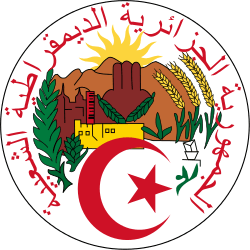Algerian Assembly election, 1948
 |
| This article is part of a series on the politics and government of Algeria |
|
Politics portal |
Elections for a new Assembly were held in French colonial Algeria on 4 and 11 April 1948. The new 120-seat Assembly was to be elected by two colleges, each of which would vote for 60 seats; one college represented around 1,500,000 Europeans and Algerian Jews, plus a few thousands "évolués" Muslims, and the second of around 8,000,000 "indigenous" Muslims. Following the victory of the Movement for the Triumph of Democratic Liberties (MTLD) in the 1947 local elections, the Assembly elections were manipulated by the authorities to ensure a favourable result, to the extent that the phrase "élection algérienne" became synonymous with rigged elections.[1]
Naegelen's elections
Marcel-Edmond Naegelen (1892-1978), a leading member of the French Socialist Party (SFIO) and hitherto Education Minister in the French government, had been appointed by the government as general governor of Algeria on 11 February 1948. Naegelen was the son of an Alsatian who had chosen to move to France after Germany's annexation of Alsace in 1870, and he was strongly against the Alsatian autonomists ("separatists"), he developed the same hostility towards the Algerian "separatists".
He organised with the administration the rigging of these elections and the sabotage of the new (1947) status of Algeria, strongly opposed by the allies of the SFIO in the French government coalition, who threatened to withdraw their support. Among them was the leader of the "French Algeria" lobby, the deputy of Constantine[2] René Mayer.
Candidates were arrested before the elections, ballot boxes were stuffed by the colonial administration and the voting in the villages (douars) took place without polling booths under the surveillance of the army. The Algerian nationalists triumphed at the first round of these elections, then their results dropped dramatically at the second, as a result of the rigging.[3][4][5]
Results
As a result, of the 60 "indigenous" seats, the MTLD won only nine, including Messali Hadj, Larbi Demaghlatrous (future ambassador of independent Algeria in Jakarta and Belgrade), Chawki Mostefaï (fr) and Djilani Embarek (member of the Algerian Constituent Assembly in 1962), the nationalist Democratic Union of the Algerian Manifesto eight, including Ferhat Abbas, whilst 43 went to independents ("administrative" deputies), often labeled as béni-oui-oui. Among the 60 "European" seats, there were four socialists, one communist, and 55 right-wingers.
| Party | First college | Second college | Total seats | ||||
|---|---|---|---|---|---|---|---|
| Votes | % | Seats | Votes | % | Seats | ||
| Union algérienne and Rally of the French People | 40 | 0 | 40 | ||||
| Movement for the Triumph of Democratic Liberties | 0 | 9 | 9 | ||||
| Democratic Union of the Algerian Manifesto | 0 | 8 | 8 | ||||
| French Section of the Workers' International | 4 | 0 | 4 | ||||
| Algerian Communist Party | 1 | 0 | 1 | ||||
| Radical Party | 2 | 0 | 2 | ||||
| Independent radicals | 4 | 0 | 4 | ||||
| Independents | 9 | 41 | 50 | ||||
| Independent Federalist | 0 | 1 | 1 | ||||
| Independent Socialist | 0 | 1 | 1 | ||||
| Total | 60 | 60 | 120 | ||||
| Source: Documents algériens. Série politique | |||||||
Consequences
After the elections, Ferhat Abbas has been reported to have told Maréchal Juin «Il n'y a plus d'autre solution que les mitraillettes.» ("There is no other solution left than the submachine guns").[4]
References
- ↑ Algeria: Polarization and Politicization Country-Data.com
- ↑ although he never actually lived in Algeria
- ↑ « Membre éminent de la SFIO, Naegelen n'a été choisi que pour couvrir le sabotage pratique dudit statut. » in: André Mandouze, Mémoires d'outre-siècle - D'une résistance à l'autre, Ed. Viviane Hamy, 1998, ISBN 978-2-87858-103-4 pp.183-184
- ↑ 4.0 4.1 Bernard Droz, Evelyne Lever, Histoire de la guerre d'Algérie, Paris, Seuil-Histoire, 1982, page 33-36
- ↑ Guy Pervillé, "Marcel-Edmond Naegelen (1892-1978)", in: Parcours, l’Algérie, les hommes et l’histoire, recherches pour un dictionnaire biographique, nr. 12, May 1990, pp. 77-81.
Further resources
Legislation
- Decree for the organization of the elections, Journal officiel, 5 March 1948
Filmed French propaganda
- Les élections à l'assemblée algérienne, Les Actualités françaises, 8 April 1948 (42s)
- Opening of the Algerian Assembly I (broadcast), Les Actualités françaises, 1948 (01min07s)
- Opening of the Algerian Assembly I (never broadcast, sound cut), Les Actualités françaises, 1948 (59s)
- Opening of the Algerian Assembly II (never broadcast, sound cut), Les Actualités françaises, 1948 (03min39s)
| ||||||||||||||||||||||||||